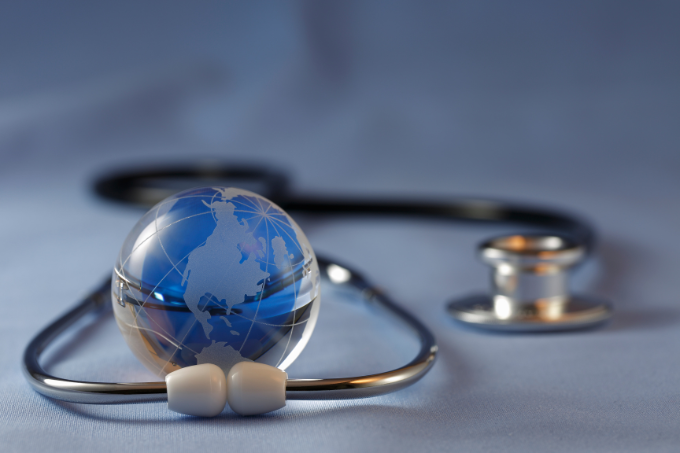5 benefits of ISO certification in global healthcare
Join NQA as we delve into the growing expectation for healthcare supply chains to achieve ISO certification, featuring the UK’s National Health Service (NHS) as a case study.

*Note: This blog uses URL links from NQA UK's Sustainability Hub. If your business is based elsewhere in the world, please get in touch with NQA in your country to learn more about sustainability.

The need for ISO standards in healthcare
Businesses worldwide are undergoing extensive transformations, with those active in the healthcare sector being no exception.
Medical equipment companies, government-backed medical providers… the global healthcare supply chain spans businesses of all sizes and natures – each with a united goal: to improve patient safety.
For this reason, healthcare businesses are increasingly turning to ISO standards to bolster efficiency, consistency and patient-first care.
![]() Keep reading to discover the benefits of ISO standards to the healthcare industry.
Keep reading to discover the benefits of ISO standards to the healthcare industry.

ISO certification benefit #1 – Boosting quality of patient care
For businesses serving the healthcare sector, ISO standards such as ISO 9001 (Quality Management) and ISO 13485 (Medical Devices Management) demonstrate their commitment to exceptional products and services – not to mention continual improvement.
With ISO certification, businesses prove an ongoing journey to better patient care, greater stakeholder satisfaction, and a generally healthier population.

Quoting an NQA client for ISO 9001, Lancashire Teaching Hospitals NHS Trust - Specialist Mobility Rehabilitation Centre:
“The benefits of ISO 9001 to the SMRC have been to give the service the credibility and confidence to expand and to drive continual improvement in the way we work.
It has enabled us to focus on service delivery and meeting patient needs and expectations. The system provides a structure and discipline to ensure consistent, uniform working and to minimise risk in line with the Trust Risk Management Strategy.”


ISO certification benefit #2 – Prioritising patient safety
In healthcare, the safety of patients, staff and other stakeholders is paramount.
ISO standards such as ISO 22301 (Business Continuity Management) and ISO 45001 (Health & Safety Management) put risk management in the spotlight, embracing a proactive rather than reactive approach.
By reducing the likelihood of adverse events (unavoidable or due to human error), stakeholders can feel reassured knowing their health is in the best possible hands.

ISO certification benefit #3 – Global recognition and respect
With ISO certification, healthcare businesses demonstrate their adherence to a globally recognised framework and standard.
It enables businesses throughout the supply chain and across geographic borders to foster relationships built on trust.
For instance, a medical equipment manufacturer achieving ISO 13485 (Medical Devices Management) makes them a more appealing supply chain partner because it proves their commitment to high-quality products.


ISO certification benefit #4 – Keeping healthcare data safe
Patient safety goes beyond exceptional care during appointments and treatment. It also involves keeping patient data secure on paper forms, health apps, medical insurance portals and more.
Security is key in an era where the healthcare sector increasingly relies upon technology, and cyber threats continue to grow. This is where ISO standards such as ISO 27001 (Information Security Management) and ISO 27701 (Privacy Information Management) come in, helping businesses ensure data confidentiality, integrity and availability.
To patients and supply chain partners, this translates into greater confidence that their data is safe – and that your business is the one to trust.

Radar Healthcare, a leading quality and compliance platform for healthcare providers, states that: "…company expansion has been fuelled by certification, unlocking previously unavailable opportunities. Having ISO 9001 and ISO 27001 also signals to Radar Healthcare customers their dedication to ethical practices and a genuine concern for data security.”


ISO certification benefit #5 – Enhancing efficiency, lowering costs
No matter whether a country’s healthcare system is government-backed or privately funded, operational efficiency is always a top priority.
ISO standards such as ISO 9001 (Quality Management) promote a systematic approach to processes and procedures. With a quality management framework, your business can effectively allocate resources and streamline regulatory and compliance requirements – enabling you to switch the focus back to patient care.

For Willows Ingredients, distributor of raw ingredients for the health and wellbeing industry, “ISO 9001 helps provide stability for the company, allowing them to expand in a controlled fashion. This includes further growth of their sales team into Europe and the UK, alongside more support staff for wider coverage.”

Case study: The NHS, net zero & sustainability standards
Given the many benefits of ISO standards, it comes as no surprise that healthcare providers globally encourage certification among supply chain partners.
In the UK, the government-backed National Health Service (NHS) has outlined a net zero roadmap.
Their goal is to become the world’s first net zero national health service, setting out two targets to achieve this:
-
NHS Carbon Footprint: Emissions controlled directly by the NHS
-
Reach net zero by 2040
-
80% reduction by 2028-2032
-
-
NHS Carbon Footprint Plus: Emissions the NHS can influence
-
Reach net zero by 2045
-
80% reduction by 2036-2039
-
To meet the requirements of the NHS net zero roadmap and remain eligible for NHS tenders, supply chain partners are seeking conformity to ISO 14064-1 (GHG Inventory), PAS 2060 (Carbon Neutrality), PPN 06/21 (Procurement Policy Notice), ISO 14001 (Environmental Management) and other sustainability standards.
![]() Want to discover more about the NHS’ roadmap to net zero? Watch our recent webinar.
Want to discover more about the NHS’ roadmap to net zero? Watch our recent webinar.

Unicorn Containers (part of Unicorn Group) manufactures metal medical bins for local UK health trusts.
They achieved PAS 2060 because “…[it] seemed like a natural first step on our journey to net zero. We supply our products to some of the world's largest end-users; with increasing competition in some of our markets, we see PAS 2060 as an opportunity to be one step ahead of our competitors. The PAS 2060 verification takes us into preferred supplier status with many of our larger customers.”
Medical equipment company Richardson Healthcare also holds PAS 2060 verification with NQA.
Quoting their reason for choosing NQA: “Following research into verification bodies and having online meetings to discuss the PAS 2060 process, we found that NQA offered the most support and guidance through the process, ensuring we fully understood the requirements.”


Final thoughts from NQA
The rise of ISO standards in healthcare reflects what every business seeks to achieve: greater efficiency, standardised processes and exceptional patient care.
With ISO certification, your business can support the advancement of global healthcare – all while remaining the top choice among supply chain partners.
Overview of ISO certification and verification opportunities for healthcare businesses:
![]() Explore how NQA can support your healthcare business. Visit our certification page today.
Explore how NQA can support your healthcare business. Visit our certification page today.
![]() Ready to get certified or want to transfer to NQA? Speak to an expert about your options.
Ready to get certified or want to transfer to NQA? Speak to an expert about your options.

